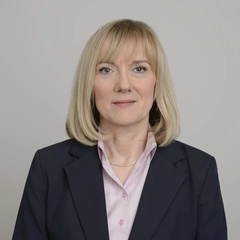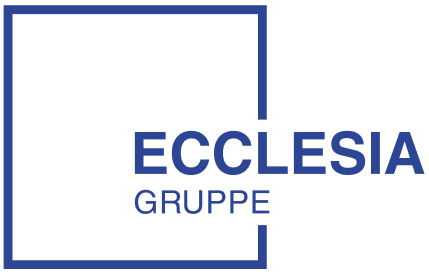
Interview with Elke Ronneberger: "The basic right to affordable housing must be guaranteed for everyone"
The Head of Social Affairs is in favour of and praises the Ecclesia Group's "Extended Tenant Protection" policy. This helps affected people to find a better way back into life through new housing. The insurance solution is seen as a sustainable contribution to social justice as well as economic thinking and social responsibility.
Ms Ronneberger, why is the housing situation relevant for Diakonie Deutschland?
Elke Ronneberger: In our view, the housing issue is part of the social issue - and this is becoming increasingly urgent in Germany. There is growing inequality; many people now have to pay a considerable proportion of their income for their rent. Some tenants even pay half of their income just for the gross cold rent. This high rental cost burden leads to a lack of money elsewhere, which makes their social participation more difficult. In addition, people on low incomes can only afford housing in certain neighbourhoods, which increases segregation in cities and communities. And our organisations are also unable to find suitable and affordable spaces for their social services.
What impact does this have on your work and the demands placed on your employees?
Elke Ronneberger : The housing shortage is also affecting social organisations. On the one hand, they can't find suitable housing for their clients, and on the other, they can't find rooms for social projects and facilities such as senior citizens' meeting places and advice centres. This means that projects that are urgently needed cannot be realised or expanded. That's why we need to work more intensively with partners in the network to find solutions. In the long term, the aim is to forge sustainable co-operations in order to secure living space for social purposes.

– Elke Ronneberger (Federal Director Sozial Policy Diakonie Deutschland)We see the state as having a clear duty. A political framework is needed to promote appropriate concepts and projects. Providing housing is a core task of the state.
What do you think needs to change - politically, socially or structurally?
Elke Ronneberger : We believe the state has a clear duty. The basic right to affordable housing must be guaranteed for everyone. This requires more social housing construction, but also a fairer distribution of the existing stock. Landlords who provide housing below the local comparative rent should receive targeted support. A political framework is needed to promote corresponding concepts and projects. Providing housing is a core task of the state.
What steps are planned in the coming months to respond to these challenges?
Elke Ronneberger: We are involved in various areas, including the German government's National Forum against Homelessness. We will also be supporting important government projects, such as the new housing benefit scheme, so that more affordable housing can be created. At the same time, we organise events, engage in political lobbying and work closely with other non-statutory welfare associations. The common goal is to make social grievances visible and highlight options for action.
Is the goal of ending homelessness by 2030 realistic in your view?
Elke Ronneberger: We expressly welcome the fact that the current federal government is also committed to this goal and has enshrined it in the coalition agreement. Of course, such an endeavour takes time - it is crucial that we keep at it. But to really end homelessness, concrete and targeted measures are needed now. After all, a fixed goal does not provide homeless people with a home.

– Elke Ronneberger (Federal Director Sozial Policy Diakonie Deutschland)People who are homeless often experience even greater discrimination than others. At the same time, the housing market remains very tight, which severely limits their chances of finding their own home.
How do you rate the new insurance solution for extended tenant protection?
Elke Ronneberger: This is a supportive step. The insurance can help to break down prejudices - for example against people who are struggling with mental stress or difficult life situations. It not only protects tenants, but also landlords, for example in the event of damage or problematic behaviour. It is important that we come closer together again as a society and that people are given real opportunities to participate - regardless of their history.
What challenges do you currently see for Diakonie?
Elke Ronneberger : People who are homeless often experience even greater discrimination than others. At the same time, the housing market is still very tight, which severely restricts their chances of finding their own home. The Ecclesia Group's insurance solution can help to mitigate risks for landlords and thus open new doors.
Are there regional differences on the housing market that you are observing?
Elke Ronneberger: Absolutely. The problems are particularly serious in large cities such as Berlin or Munich. Special measures are needed there, such as the sheltered market segment in Berlin. Here, flats are specifically allocated to people with special needs. State governments can also set up their own housing promotion programmes - for example by stipulating requirements for social housing in new builds. Munich is already leading the way here. And we are in favour of discussing a new public housing benefit scheme - taking into account the interests of all stakeholders, of course.
Are there any other issues that are particularly close to your heart?
Elke Ronneberger: Yes, absolutely. Housing is a basic right - it must be at the centre of socio-political work. We support many smaller projects, for example for young mothers in need who would otherwise have few opportunities. These issues don't always attract media attention, but they affect the daily lives of many people. Women in particular often only realise late on that they and their children are in dangerous situations. This is where we come in with preventative measures. The aim is to prevent problems from arising in the first place.
Can you please name a specific project that you think is particularly worth mentioning?
Elke Ronneberger: In Berlin, a large social welfare organisation is currently building 100 flats that are deliberately being rented out below market price. This project is a successful practical example from a metropolitan area that other regions can learn a lot from.
Tenant protection policy from the Ecclesia Group: a solution that benefits everyone
The policy is primarily aimed at owners who are prepared to rent to people with poor credit ratings, low incomes or from difficult living conditions.
The advantages are manifold:
- For tenants: Access to housing despite a poor credit rating - a first step back to a regular life.
- For landlords: Protection against economic risks with simultaneous social commitment.
- For social organisations: Relief in finding accommodation and better support for clients.
- For insurers: a new, socially responsible business area with scaling potential.
Extended tenant protection: New insurance policy creates security and prospects
Homelessness is a growing social problem: according to the German government's latest Homelessness Report, around 532,000 people in Germany were without a permanent home in January 2024. While local authorities and social institutions continue to face major challenges, there is enormous untapped potential in the private housing market - especially among owners with small housing portfolios.
This is precisely where the new "Extended Tenant Protection" insurance policy comes in, which the Ecclesia Group has developed in close cooperation with Dr Jens Rannenberg, Board Member of the Dachstiftung Diakonie and Chairman of the Board of the Evangelischer Bundesverband Existenzsicherung und Teilhabe.
The number of people who have no tenancy agreement and no home of their own has almost doubled since January 2022. Most of them are housed by local authorities and independent welfare organisations, while around a fifth are living homeless with friends and acquaintances or on the street without any accommodation. The latter do not receive adequate medical care and are exposed to dangers such as violence and theft. In addition, their insecure living situation can lead to addiction, unemployment and mental health problems. It is therefore important to find these people a home as quickly as possible so that they can stabilise and re-enter the labour market. However, this is easier said than done, as the number of subsidised flats is continually falling and private landlords are reluctant to rent their flats to "poorer tenants".
"Two thirds of flats in Germany belong to owners who own no more than five units," explains Dr Jens Rannenberg. "Many of them are worried about letting to economically disadvantaged people - often because they have had bad experiences or fear high follow-up costs." In order to realise private housing potential, owners need to be targeted and given more security. The "Karlsruhe model", with which the city has already been successful for many years, is a good example. In order to be able to utilise private residential space, the City of Karlsruhe first concludes a contract with the owners, who receive a renovation subsidy and a temporary rent loss guarantee if required. In addition, the tenants are supported by social pedagogues. This gives the owners more security. According to Dr Jens Rannenberg, there are individual cases in which the follow-up costs can amount to between 20,000 and 50,000 euros - a risk that deters many private landlords.
The new product aims to reduce precisely this uncertainty. The policy offers insurance against loss of rent, covers costs in the event of damage and - if desired - even offers integrated legal protection. The result is an "all-round carefree package for new tenants", says Ansgar Kentrup, member of the management team at Ecclesia Versicherungsdienst.
Development with social responsibility
The idea took shape in June 2023 when Dr Jens Rannenberg met Ansgar Kentrup. "We philosophised about a possible solution and analysed the market situation. Support came from product management, with whom the insurance model was finalised and initial discussions were held with insurers. "A process like this takes time," explains Ansgar Kentrup. "We had to translate an abstract risk into concrete insurance conditions - across all lines of business. As a broker, we act as a kind of translator between the social problem and the economic protection." An important success factor here was the close collaboration with Dr Jens Rannenberg, who contributed market data as well as study results and acted as a sparring partner to identify specific practical needs.
"Our aim is to get people out of homelessness and provide them with a permanent home," says Dr Jens Rannenberg. With the new policy, they can not only move in - they also have the option of taking over the contract themselves later and becoming independent.
Social responsibility is part of our DNA
As a group of companies with a church background, we bear responsibility - not only towards our shareholders, but also towards society as a whole. This attitude is deeply rooted in our DNA. It motivates us to develop solutions that go beyond traditional insurance cover. This results in products such as extended tenant protection, which creates social access and promotes trust. Similarly, we develop insurance concepts for midwives who work under special risks or for workshops where people with disabilities are given the opportunity to participate in working life. These solutions contribute to the common good - because we are convinced that insurance can also have a social impact.
The shareholders of the Ecclesia Group are theEvangelisches Werk für Diakonie und Entwicklung e. V.theGerman Caritas Association e. V.and theEvangelical Church in Germany. UNION Versicherungsdienst GmbH, which belongs to the Group, also includes theGerman Parity Welfare Associationhas been a co-partner since 1960.
Our compass: the specific needs of our customers
We are always guided by individual needs - regardless of whether we are dealing with a shareholder, an industrial company, a start-up, a hospital or a social organisation. We think in terms of the problem, not the product. We listen, analyse, develop - and thus find tailor-made solutions that really meet the respective requirements. Because we are convinced that only those who deal honestly with the challenges of their customers can create sustainable security - both economically and socially.
Two projects that create new living space with the support of diaconal organisations
Diakonie-Haus in Hamburg's Münzviertel neighbourhood: housing and medical help for homeless people
Homeless people will soon find a new home and comprehensive medical care in the Diakonie-Haus in Hamburg's Münzviertel neighbourhood. A doctor's surgery for people without health insurance and 40 flats for people who cannot find accommodation on the open housing market are currently being built here. The flats are each around 35 square metres in size and have one room with a bathroom and a small kitchen. This small home of their own enables homeless people to stabilise themselves and work on personal challenges such as debt or addiction.
The health situation of homeless people in Hamburg has deteriorated in recent years, explains the Diakonie project team on the website stiftung.diakonie-hamburg.de. The lack of access to medical care is dramatic, as preventable illnesses could shorten the life expectancy of those affected. A doctor's surgery is set up in the basement of the Diakonie-Haus to provide unbureaucratic medical support. Volunteer doctors are available for general and specialised treatment.
Each flat receives a kitchenette and initial equipment, which is provided as required. The job centre also provides support, but often with delays. By bundling several aid projects in the Diakonie-Haus, medical care for homeless people is strengthened. Diakonie is committed to a city that takes responsibility and realises the right to housing and health for all.
Social diaconal project in Berlin-Mitte: 100 new-build flats with rent and occupancy restrictions
With the signing of an urban development contract between the Paul Gerhardt-Stift and the Berlin district office in Mitte, an important step has been taken to combat the housing shortage in the German capital. The contract provides for the construction of 116 new residential units, including an underground car park and three commercial units. Of these, 100 flats will be socially subsidised rental flats for low- and middle-income households.
"Berlin is growing steadily, and as the population grows, so does demand on the housing market. It is important that we as a society take responsibility," explains Pastor Martin von Essen, head of the Paul Gerhardt-Stift. District Councillor Ephraim Gothe thanks all those involved for their valuable contribution to alleviating the housing shortage.
The Paul Gerhardt-Stift is committed to realising the construction measures at Berliner Barfußstraße 6 in accordance with the stipulated specifications. Construction is scheduled to begin within six months of the demolition of the former "Krüppelheim", and the first flats are expected to be ready for occupation in 2028.
As part of the project, 100 new-build flats will be provided with rent and occupancy restrictions to meet the needs of low-income households. All tenancies will be concluded for an indefinite period to ensure fair access. The Paul Gerhardt-Stift is a social-diaconal organisation with a 149-year tradition that is committed to social projects in neighbourhood, family and refugee work. The staff attach great importance to sustainability. The new buildings are constructed according to modern ecological standards in order to minimise energy consumption and reduce CO₂ emissions.
